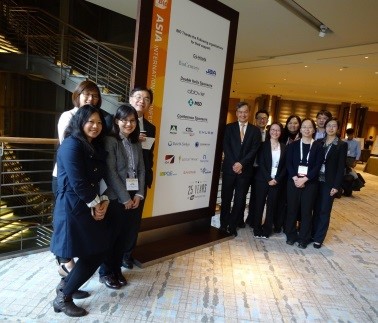Taiwanese Biomedical Research Teams Shone Through in BIO Asia International Conference
The Bio Asia International Conference is an important regional event for innovative research collaboration between the industry and the academia.

The Bio Asia International Conference is an important regional event for innovative research collaboration between the industry and the academia. This year’s Conference was held in Tokyo, Japan, on March 19 and 20. In the session of BIO SPARK Showcase, which is the highlight of the Conference, the Taiwanese research teams won three places, outshining other Asian countries. The Taiwanese delegation, led by Dr Fong-Chin Su, Deputy Minister of the Ministry of Science and Technology (MOST), made huge efforts in exhibiting Taiwan’s biomedical R&D capacities. The delegation also actively mingled with opinion leaders and key figures in the industry and research fields of other countries with a view to seeking opportunities for future collaboration and room for market expansion.
Biomedical industry‘s value chain opens up opportunities for start-ups
By providing selected candidates with necessary training, the SPARK Program, originated at Stanford University, aims to help universities to translate biomedical research discoveries into products which bring benefits to both patients and the society. Taiwan started the liaison with Stanford University on the SPARK Program in 2013, with the principal aim of promoting the translation of research findings. Dr Fong-Chin Su, the Deputy Minister of the MOST and also the CEO of the Center for the Biomedical Industry Innovation Program, expressed that the linkage between biomedical innovations and venture capitals creates a new collaboration model which adequately docks the academic research results at the industry. The SPARK Program plays an important role in this new model.
The academia and the industry collaborate on new drug R&D
The BIO and the Stanford SPARK Program jointly organized the BIO SPARK Showcase for the first time in the BIO Asia International Conference to showcase projects selected from Asian countries. This year, total 7 research teams were selected by the panel, including 3 teams from Taiwan. They are Prof. Yu-Feng Tseng’s research team in the National Taiwan University about the “drugs for improving the negative symptoms and cognitive functions associated with schizophrenia”, Prof. Ling-Wei Hsin’s research team in the National Taiwan University about the “first-in-class new drug for treating intestinal fistula”, and Prof. Yu-Ching Lee’s research team in Taipei Medical University about the “the development of antibody drugs for cancers”. These three teams made Taiwan outshine other countries in this year’s BIO SPARK Showcase. Since 2013, Professor Daria Mochly-Rosen, the founder of the Stanford SPARK Program, has been invited by the Taiwan SPARK, with full support from the MOST, to assist in screening potential research teams in Taiwan. All selected teams receive guidance directly from the Stanford SPARK Program and Silicon Valley mentors. As a result, the Taiwanese research team’s exhibition of innovative technology and the success in the commercialization of research discoveries attracted huge attention and acknowledgement in this year’s BIO Asia Conference. About 450 delegates from 24 countries attended this year’s Conference and went to the 1260 one-on-one matchmaking sessions held by the organizer.
Taiwanese biotech companies jointly showcased the R&D capacities
This year’s Taiwanese delegation includes the following biotech companies: • Tanvex Biopharma (R&D, manufacturing and marketing of biosimilars and new drugs) • Twi Biotechnology (drugs for treating diseases of innate immune system) • Personal Genomics (DNA analyzers, reagents and peripheral products) • Mycenax Biotech (R&D of biologics, manufacturing of drug substances and sterile preparations, development of analytical methods) • ACT Genomics (ACTRiskTM - genetic testing for hereditary cancers) • Caliway Biopharma (R&D of new drugs for obesity and new injections for anti-aging and aesthetic medicine) • Foresee Pharma (improvement of sustained-release injections, and the R&D of NCE new drugs) • Original Biomedical (R&D of non-NCE new drugs and the drug delivery systems for new dosage forms and new indications) • HAN Biomedical (biological materials and hyaluronic acid for adhesion prevention)
One of the missions of the “Biomedical Industry Innovation Program” is to lead the Taiwan biotech industry to the global stage and to push Taiwanese brands into the international high-end market. To accomplish this mission, it is important to forage a collaborative relationship between the industry and the researcher institutes at the early stage so as to develop creative and novel ideas for unmet medical needs. With the government’s full support, the biotech industry in Taiwan will continue shining through on the global stage and developing the potential to become the next trillion-dollar industry in Taiwan.